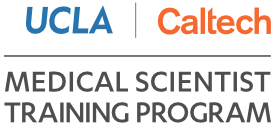Featured Student
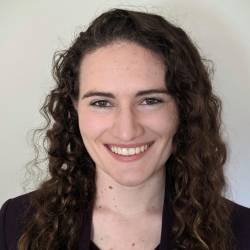
Shannon Esswein, PhD
Current level:
MD3 (2020-2021)
Undergraduate institution:
UCLA
Research interest:
Structural biology, Viruses, Immunology, Neuroscience
Current lab:
Laboratory of Pamela Bjorkman
Recent awards:
DeKarman Dissertation Fellowship
Forbes 30 Under 30 – Science
Recent publications:
Abernathy ME*, Dam KA*, Esswein SR*, Jette CA*, Bjorkman PJ. How antibodies recognize pathogenic viruses: Structural correlates of antibody neutralization of HIV-1, SARS-CoV-2, and Zika. Viruses. 2021 Oct; 13(10), 2106. doi: 10.3390/v13102106. *co-first authors
Snyder A, Xiang D, Smith A, Esswein S, Toubat O, Di Capua J, Kwan JM, Daye D. Gender disparities among medical students choosing to pursue careers in medical research: a secondary cross-sectional cohort analysis. BMC Med Educ. 2021 Nov 25;21(1):591. doi: 10.1186/s12909-021-03004-z. PMID: 34823508; PMCID: PMC8620216.
Barnes CO, Jette CA, Abernathy ME, Dam K-M A, Esswein SR, Gristick HB, Malyutin AG, Sharaf NG, Huey-Tubman KE, Lee YE, Robbiani DF, Nussenzweig MC, West AP, Bjorkman PJ. SARS-CoV-2 neutralizing antibody structures inform therapeutic strategies. Nature. 2020 Dec;588(7839):682-687. doi: 10.1038/s41586-020-2852-1. Epub 2020 Oct 12. PMID: 33045718; PMCID: PMC8092461.
Esswein SR, Gristick HB, Jurado A, Peace A, Keeffe JR, Lee YE, Voll AV, Saeed M, Nussenzweig MC, Rice CM, Robbiani DF, MacDonald MR, Bjorkman PJ. Structural basis for Zika envelope domain III recognition by a germline version of a recurrent neutralizing antibody. Proc Natl Acad Sci U S A. 2020 Apr 22. pii: 201919269. doi: 10.1073/pnas.1919269117. PubMed PMID: 32321830.
Van Rompay KKA, Coffey LL, Kapoor T, Gazumyan A, Keesler RI, Jurado A, Peace A, Agudelo M, Watanabe J, Usachenko J, Singapuri A, Immareddy R, Ardeshir A, Stuart JB, Bournazos S, Ravetch JV, Balderes PJ, Lorenz IC, Esswein SR, Keeffe JR, Bjorkman PJ, Wang Q, Rice CM, MacDonald MR, Nussenzweig MC, Robbiani DF. A combination of two human monoclonal antibodies limits fetal damage by Zika virus in macaques. Proc Natl Acad Sci U S A. 2020 Apr 7;117(14):7981-7989. doi: 10.1073/pnas.2000414117. Epub 2020 Mar 24. PubMed PMID: 32209664; PubMed Central PMCID: PMC7149495.
Featured Faculty
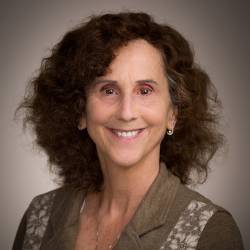
Pamela Bjorkman, PhD
Affiliations/ Appointments/ Titles:
David Baltimore Professor of Biology and Biological Engineering
Featured Student
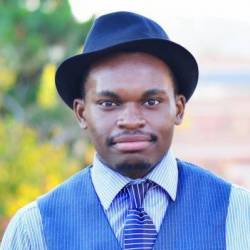
Adewunmi Adelaja, PhD
Current level:
MD3 (2020-2021)
Undergraduate institution:
The Ohio State University
Research interest:
Immunology, Cell-mediated immunotherapy, Single-cell analysis, Information theory
Current lab:
Laboratory of Alexander Hoffmann
Recent publications:
Adelaja, A.*, Taylor, B.*, Sheu, K. M., Liu, Y., Luecke, S., & Hoffmann, A. (2021). Six distinct NFκB signaling codons convey discrete information to distinguish stimuli and enable appropriate macrophage responses. Immunity, 54(5). doi:10.1016/j.immuni.2021.04.011
Tang, Y.,Adelaja, A., Ye, F. X., Deeds, E., Wollman, R., & Hoffmann, A. (2021). Quantifying information accumulation encoded in the dynamics of biochemical signaling. Nature Communications, 12(1). doi:10.1038/s41467-021-21562-0
Edwards, M., Johnson, M. D., Fernandez, R. W., Montgomery, B. L., Adelaja, A., & Akingbade, T. (2020). Mentoring to Foster a Diverse Future. Cell, 183(3), 561-563. doi:10.1016/j.cell.2020.10.010
Mitchell, S. *, Mercado, E.*, Adelaja, A., Ho, J., Fortmann, K., Cheng, Q., Ghosh, G., & Hoffmann, A. (2019). An NFκB activity calculator to delineate signaling crosstalk: Type I and II interferons enhance NFκB via distinct mechanisms. Front. Immunol. 10:1425. doi: 10.3389/fimmu.2019.01425
Adelaja, A., Hoffmann, A. (2019). Signaling crosstalk mechanisms that may fine-tune pathogen-responsive NFκB. Front. Immunol. 10:433. doi: 10.3389/fimmu.2019.00433
Recent awards:
Keystone Symposia Future of Science Fund scholarship (2020)
American Physician-Scientist Association Travel Award (2020)
NRSA F31 Fellowship (2019 – 2020)
Runner-up Merck kGaA InnovationCup International Competition (2019)
American Physician-Scientist Association Travel Award (2019)
Travel Award to Cold Spring Harbor Systems Immunology Conference (2019)
Vascular Biology Training Grant (2015 – 2019 )
Travel Award to Cold Spring Harbor Biological Data Science Conference (2018)
American Physician-Scientist Association Travel Award (2018)
Eastland-Fairfield Career & Technical Schools Hall of Fame Inductee (2018)
Physician-Scientist Association Poster Award (2017)
MD/PhD National Student Conference Travel Award (2017)
Best abstract award Society for Experimental Biology and Medicine (2016)
Featured Faculty
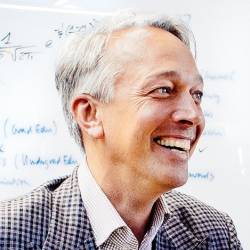
Alexander Hoffmann, PhD
Affiliations/ Appointments/ Titles:
MIMG Professor and Director of the QCBio Institute
Honors:
Thomas A Asher chair of Microbiology and Immunology
Biographical sketch:
Alexander Hoffmann is the Thomas M Asher Professor of Microbiology and Immunology at UCLA, and the founding director of the Institute for Quantitative and Computational Biosciences (QCBio). His research aims to develop a predictive understanding of immune responses, focusing on immune sentinel macrophages, on the generation of antibody responses by B-cells, and on the impact of immune responses on the generation of new immune cells via hematopoiesis. Before joining UCLA in 2014, he was Professor of Biochemistry at UCSD; there he founded the San Diego Center for Systems Biology (SDCSB), co-founded the BioCircuits Institute (BCI), and directed the Graduate Program in Bioinformatics and Systems Biology. He holds degrees in Physics and Zoology (BA, Cambridge University), Biochemistry and Molecular Biology (Ph.D., Rockefeller University) and owes his training to Robert Roeder and David Baltimore, as well as his many students, postdocs and collaborators.
Featured Student
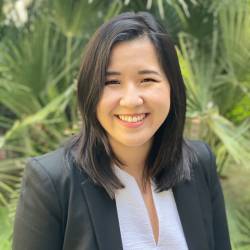
Xuan Tran, PhD
Current level:
MD4 (2020-2021)
Undergraduate institution:
University of California, Irvine
Research interest:
Developmental Neuroscience, Neurophysiology and Neuroimaging
Current lab:
Jeste Developmental Neurophysiology Lab
Recent publications:
Tran XA, McDonald N, Dickinson A, Scheffler A, Frohlich J, Marin A, Kure Liu C, Nosco E, Senturk D, Dapretto M, and Jeste SS. (2020). Functional connectivity during language processing in 3-month-old infants at familial risk for autism spectrum disorder. European Journal of Neuroscience. DOI: https://doi.org/10.1111/ejn.15005.
Tran XA. (2019). Neural Connectivity in Infants at Familial Risk for Autism Spectrum Disorder. eScholarship. https://escholarship.org/uc/item/5p2132kd.
Dodakian L, McKenzie AL, Le V, See J, Pearson-Fuhrhop K, Burke Quinlan E, Zhou RJ, Augsberger R, Tran XA, Friedman N, Reinkensmeyer DJ, and Cramer SC. (2017). A home-based telerehabilitation program for patients with stroke. Neurorehabilitation and Neural Repair 31 (10-11): 923-933. DOI: https://doi.org/10.1177/1545968317733818.
Recent press releases:
Autism Science Foundation’s Research Recap 2020: https://autismsciencefoundation.org/what-is-autism/autism-science/research-by-year/research-recap-2020/?fbclid=IwAR0YVTAPVuMl-aoyuQcKg8s3_a12t4zJuCo4lozv2wlaGSPnvAKxzx_mFVA
Flash talk interview at the International Society for Autism Research (INSAR) 2019 Meeting: https://www.autismspeaks.org/science-news/autism-speaks-newsroom-insar-2019?fbclid=IwAR3zYjZ-3Igo14jvWtp4M1qjh7rlIAqQbBXxELSmwqeZyZEVLsbS-1QCu80
Recent awards:
Ray E & Louise T Teal Medical Education & Research Fellowship (2020-2021)
Autism Speaks Dennis Weatherstone Predoctoral Fellowship (2017-2019)
Achievement Rewards for College Scientist Foundation Award (2016-2019)
International Society for Autism Research Student Travel Award
Brain Research Institute/ Semel Institute Neuroscience Graduate Travel Award
Featured Faculty

Shafali Spurling Jeste, MD
Affiliations/ Appointments/ Titles:
Associate Professor in Psychiatry, Neurology and Pediatrics
Director, UCLA CARING Clinic
Co-Director, UCLA Tuberous Sclerosis Center
Director, Biomarkers Core of the UCLA Center for Autism Research and Treatment (CART)
Honors:
In 2019, Dr. Jeste was awarded the Presidential Early Career Award for Scientists and Engineers for her innovations in research in early predictors and intervention for genetic neurodevelopmental disorders.
Biographical sketch:
Dr. Jeste is a behavioral child neurologist specializing in autism and related neurodevelopmental disorders. She is an Associate Professor-in-Residence in Psychiatry, Neurology and Pediatrics at the UCLA David Geffen School of Medicine, the director of the UCLA CARING Clinic, co-Director of the UCLA Tuberous Sclerosis Center of Excellence, and a lead investigator in the UCLA Center for Autism Research and Treatment (CART). After earning a BA in philosophy from Yale University in 1997 and her MD from Harvard Medical School in 2002, Dr. Jeste completed a residency in child neurology and a fellowship in behavioral child neurology at Boston Children’s Hospital. She joined UCLA in 2010. Dr. Jeste’s research is focused on developing methods to improve precision in the diagnosis and treatment of neurodevelopmental disorders. Her lab studies neurodevelopmental disorders from early infancy through late childhood. Dr. Jeste has designed innovative studies in early predictors of autism in Tuberous Sclerosis Complex (TSC) that integrate biomarkers with behavior to define atypical development prior to the onset of autism. This work in TSC has led to the first randomized controlled clinical trial of behavioral intervention for these infants and has paved the way for other early intervention trials in rare genetic syndromes. Dr. Jeste’s research is directly inspired by her clinical work. To address the many gaps in medical care for rare genetic forms of neurodevelopmental disorders, she founded and directs the CARING (Care and Research in Neurogenetics) Clinic. This clinic has become the hub for several new clinical trials for genetic syndromes. Dr. Jeste’s work is funded by the National Institutes of Health, the Department of Defense and the Simons Foundation. She holds several national and international leadership positions including the Board of Directors of the American Brain Foundation, Board of Directors of the National Organization for Rare Disorders, the Board of Directors of the International Society for Autism Research, and she is Chair of the International Baby Siblings Research Consortium.
Featured Student
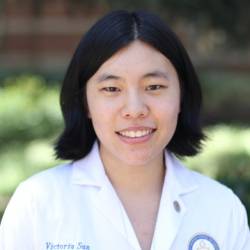
Victoria Sun
Current level:
PhD4 (2020-2021)
Undergraduate institution:
University of Chicago
Research interest:
Developmental Biology
Current lab:
Laboratory of Gay Crooks
Recent publications:
Montel-Hagen A*, Sun V*, Casero D, Tsai S, Zampieri A, Jackson N, Li S, Lopez S, Zhu Y, Chick B, He C, de Barros SC, Seet CS, Crooks GM. In Vitro Recapitulation of Murine Thymopoiesis from Single Hematopoietic Stem Cells. Cell Reports. 2020 Oct 27;33(4):108320. DOI: 10.1016/j.celrep.2020.108320.
UCLA newsletter: https://newsroom.ucla.edu/releases/millions-diverse-t-cells-from-single-blood-stem-cell
Montel-Hagen A*, Seet CS*, Li S, Chick B, Zhu Y, Chang P, Tsai S, Sun V, Lopez S, Chen HC, He C, Chin CJ, Casero D, Crooks GM. Organoid-Induced Differentiation of Conventional T Cells from Human Pluripotent Stem Cells. Cell Stem Cell. 2019 Mar 7;24(3):376-389.e8. DOI: 10.1016/j.stem.2018.12.011.
UCLA newsletter: https://stemcell.ucla.edu/news/ucla-scientists-create-renewable-source-cancer-fighting-t-cells
Recent awards:
Broad Stem Cell Research Center (BSCRC) Training Program Predoctoral Fellowship; Rose Hills Foundation Graduate Scholarship (2019-2021)
Featured Faculty
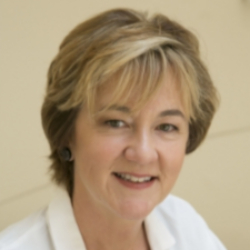
Gay Crooks, MD
MSTP Role:
MSTP Admissions Committee Member
Affiliations/ Appointments/ Titles:
Professor, Pathology and Laboratory Medicine, Pediatrics
Co-Director, Eli & Edythe Broad Center of Regenerative Medicine & Stem Cell Research
Director, Jonsson Comprehensive Cancer Center, Cancer and Stem Cell Biology Program Area
Biographical sketch:
Dr. Crooks graduated from medical school at the University of Western Australia and completed her FRACP (pediatrics) at Princess Margaret Hospital for Children prior to her fellowship training in Pediatric Hematology-Oncology at Children’s Hospital Los Angeles (CHLA). In 2009 her research program moved to UCLA, where in addition to running her research program, Dr. Crooks is a pediatric bone marrow transplant physician in the Division of Pediatric Hematology-Oncology at Mattel Children’s Hospital, UCLA.
Featured Student
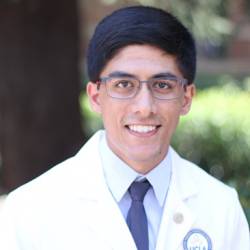
Prashant Bhat
Current level:
PhD4 (2020-2021)
Undergraduate institution:
UC Berkeley
Research interest:
Genomics and RNA Biology
Current lab:
Guttman Lab (Caltech)
Recent publications:
Banerjee, M. Blanco, E. Bruce, D. Honson, L. Chen, A. Chow, P. Bhat, N. Ollikainen, S. Quinodoz, C. Loney, J. Thai, Z.D. Miller, A.E. Lin, M.M Schmidt, D.G. Stewart, D. Goldfarb, G. De Lorenzo, S.J. Rihn, R. Voorhees, J.W. Botten, D. Majumdar, and M. Guttman (2020). “SARS-CoV-2 disrupts splicing, translation, and protein trafficking to suppress host defenses.” Cell. (In Press, Accepted)
S. Quinodoz, P. Bhat, N. Ollikainen, J.W. Jachowicz, A. Banerjee, P. Chovanec, A. Chow, Y. Markaki, K. Plath and M. Guttman (2020). “RNA promotes the formation of spatial compartments in the nucleus.” bioRxiv. DOI:https://doi.org/10.1101/2020.08.25.267435
S. Quinodoz, N. Ollikainen, B. Tabak, A. Palla, J.M. Schmidt, E. Detmar, M. Lai, A. Shishkin, P. Bhat, Y. Takei, V. Trinh, E. Aznauryan, P. Russell, C. Cheng, M. Jovanovic, A. Chow, L. Cai, P. McDonel, M. Garber, and M. Guttman (2018). “Higher-order inter-chromosomal hubs shape 3-dimensional genome organization in the nucleus.” Cell. 174(3):744-757.
Featured Faculty
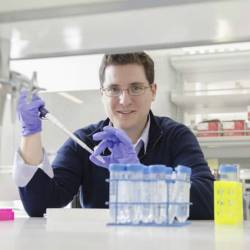
Mitchell Guttman, PhD
Affiliations/ Appointments/ Titles:
Professor of Biology
Investigator, Heritage Medical Research Institute
Honors:
NIH Director’s Transformative Research Award, Agilent Early Career Professor Award, Pew-Steward Scholar for Cancer Research, Sontag Foundation Distinguished Scientist Award, Searle Foundation Scholar, Forbes magazine ’30 under 30′, NIH Director’s Early Independence Award
Biographical sketch:
Featured Student
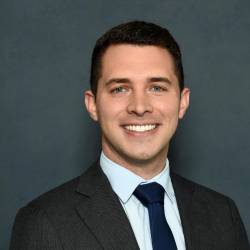
Cody Aros, PhD
Current level:
MS3 (2020-2021)
Undergraduate institution:
Stanford University
Research interest:
Stem Cell Biology, Regenerative Medicine
Current lab:
Gomperts Lab
Recent publications:
Aros, C. J., P. Vijayaraj, C. J. Pantoja, B. Bisht, L. K. Meneses, J. M. Sandlin, J. A. Tse, M. W. Chen, A. Purkayastha, D. W. Shia, J. M. S. Sucre, T. M. Rickabaugh, E. K. Vladar, M. K. Paul and B. N. Gomperts (2020). “Distinct Spatiotemporally Dynamic Wnt-Secreting Niches Regulate Proximal Airway Regeneration and Aging.” Cell Stem Cell. DOI: https://doi.org/10.1016/j.stem.2020.06.019.
Aros, C. J., M. K. Paul, C. J. Pantoja, B. Bisht, L. K. Meneses, P. Vijayaraj, J. M. Sandlin, B. France, J. A. Tse, M. W. Chen, D. W. Shia, T. M. Rickabaugh, R. Damoiseaux and B. N. Gomperts (2020). “High-Throughput Drug Screening Identifies a Potent Wnt Inhibitor that Promotes Airway Basal Stem Cell Homeostasis.” Cell Rep 30(7): 2055-2064 e2055. DOI: https://doi.org/10.1016/j.celrep.2020.01.059.
Featured Faculty
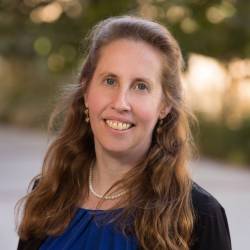
Brigitte Gomperts, MD
Affiliations/ Appointments/ Titles:
Vice Chief of Research for Pediatric Hematology-Oncology
Co-Director Jonsson Comprehensive Cancer Center – Cancer Stem Cell and Biology Program
Honors:
STOP Cancer Foundation award for Lung Cancer Research, Margaret E. Early award for cancer research, Ablon Scholar award for cancer research
Biographical sketch:
Dr. Brigitte Gomperts is Professor of Pediatrics and Pulmonary Medicine at the University of California-Los Angeles (UCLA). Dr. Gomperts earned her medical degree from the University of Witwatersrand in Johannesburg, South Africa and completed her residency and pediatric hematology/oncology fellowship at Washington University in St. Louis/ St. Louis Children’s Hospital. She is a graduate of the Pediatric Scientist Development Program (PSDP). She co-directs the UCLA Jonsson Comprehensive Cancer Center Cancer Stem Cell Biology Program and is Vice Chief for research in the UCLA division of pediatric hematology/oncology. She treats young children with cancer and blood diseases. Observing the side effects that chemotherapy, radiation therapy and bone marrow transplant had on her patients’ lungs, Gomperts became interested in lung repair and regeneration. Her scientific research focuses on repair and regeneration of the lungs, and how the normal repair mechanisms are altered in lung diseases. She is particularly interested in stem/progenitor cell populations in the lungs and determining the regeneration potential of each of these subpopulations in order to better understand repair and the possibility of cell-based therapies for lung diseases. Her lab is using novel bioengineered models to understand repair and regeneration in the proximal and distal lung and has expertise in adult stem cell models of lung diseases and patient-specific induced pluripotent stem cell lung disease modeling and high throughput drug screening. The ultimate goal is to use this knowledge to develop novel targeted therapies and prevention strategies for lung diseases. Major areas of interest include lung fibrosis, mucociliary clearance, Chronic Obstructive Pulmonary Disease and premalignant lesions with stepwise progression to lung cancer. As a physician-scientist, her lab is particularly interested in translational research that will result in new therapies for lung diseases.
Because of the lung’s complexity, growing lung cells in two-dimensions in the laboratory doesn’t always provide a clear picture of lung disease. To overcome this challenge, Gomperts’ lab uses stem cells to create three-dimensional lung-like organoids that mimic the air sac structures of actual lungs. Gomperts and her team were the first to create these lung-like organoids, which represent the initial steps toward generating patient-specific transplantable lung tissue in the future. In the meantime, the organoids are useful for disease-in-a-dish modeling, high-throughput drug screening and testing for compounds that could be toxic to the lungs. Gomperts’ lab is using these three-dimensional lung organoids to study idiopathic pulmonary fibrosis, or IPF, a chronic lung scarring disease that makes the lungs thick and stiff, resulting in shortness of breath and lack of oxygen to the brain and vital organs. Gomperts and her team are also using induced pluripotent stem cells derived from patients with IPF grown on hydrogels to create disease-in-a-dish models of fibrosis to study the nature of the disease and identify compounds that may prevent or reverse fibrosis. Gomperts’ research also focuses on understanding the tissue-specific stem cells of the epithelium of the upper airways, the layer of cells that are directly in contact with environment and that we breathe in. Gomperts hopes that a better understanding of the molecular processes behind self-renewal of these cells will lead to methods to prevent lung cancer and breathing problems.
Featured Student
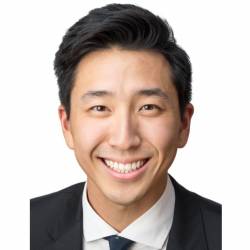
Justin Lee
Current level:
PhD3 (2020-2021)
Undergraduate institution:
Johns Hopkins University
Research interest:
Synthetic Biology, Cellular Engineering, Immunotherapy
Current lab:
Shapiro Lab (Caltech)
Recent awards:
2020 PD Soros Fellow
Featured Faculty
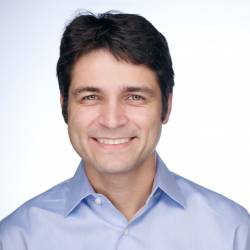
Mikhail Shapiro, PhD
Affiliations/ Appointments/ Titles:
Professor of Chemical Engineering
Investigator, Heritage Medical Research Institute
Biographical sketch:
Mikhail Shapiro is a Professor of Chemical Engineering and an Investigator of the Heritage Medical Research Institute at Caltech. He received his PhD in Biological Engineering from MIT and his BSc in Neuroscience from Brown and conducted post-doctoral research at the University of Chicago and the University of California, Berkeley, where he was a Miller Fellow. The Shapiro laboratory develops biomolecular technologies allowing cells to be imaged and controlled inside the body using sound waves and magnetic fields, to enable the study of biological function in vivo and the development of cell-based diagnostic and therapeutic agents. Mikhail has been awarded the Packard Fellowship, the Pew Scholarship, the Camille Dreyfus Teacher-Scholar Award, the Burroughs Welcome Career Award at the Scientific Interface, the DARPA Young Faculty Award and Director’s Fellowship, the Sontag Foundation Distinguished Scientist Award, the Roger Tsien Award for Excellence in Chemical Biology, the Vilcek Prize and the Technology Review TR35 award for top innovators under age 35. More information about the Shapiro Lab can be found online at shapirolab.caltech.edu.
Featured Student
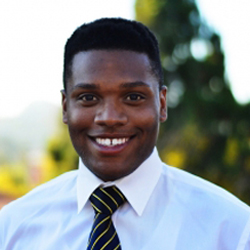
Richard Morgan, PhD
Current level:
MD3 (2019-2020)
Undergraduate institution:
California State University, Northridge
Research interest:
Molecular and Medical Pharmacology
Current lab:
Don Kohn, MD, PhD
Dissertation title:
Gene Therapy Vectors for Sickle Cell Disease
Featured Faculty
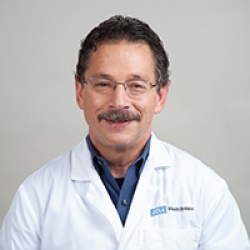
Donald B. Kohn, MD
Titles:
Donald B. Kohn, MD
Distinguished Professor
Professor, Microbiology, Immunology & Molecular Genetics, Pediatrics (Hematology/Oncology), Molecular & Medical Pharmacology, Member: Eli & Edythe Broad Center of Regenerative Medicine & Stem Cell Research, Tumor Immunology Program at the Jonsson Comprehensive Cancer Center (JCCC), UCLA Chrildren’s Discovery and Innovation Institute, Immunity, Microbes & Molecular Pathogenesis GPD Home Area, Molecular Pharmacology GPB Home Area, Genetics & Genomics GPB Home ARea, Center for Duchenne Muscular Dystrophy, Blood and Marrow Transpant Center, CTSI, Pilot and Collaborative Translational Clinical Studies Program
Honors:
Dr. Donald B. Kohn was the President of the American Society for Gene Therapy (2003-2004) and ws the recipient of an Elizabeth Glaser Scientist Award from the Pedicatric AIDS Foundation and a Distinguished Clinical Scientist Award from the Doris Duke Charitable Foundation.
Donald B. Kohn earned his bachelor’s and master’s degrees from the University of Illinois, Champaign-Urbana and his medical degree in 1982 from the University of Wisconsin School of Medicine. He completed a pediatric internship and residency in Wisonsin followed by a medical staff fellowship in the Lymphoid Malignancies Branch (formerly the Metabolism Branch) of the National Cancer Institute. He began working on gene therapy as a fellow at the National Institute of Health in 1985. He was at Children’s hospital Los Angeles, USC Keck School of Medicine for 21 years, where he rose to the rank of Professor and sered as the Head of the Division of Research Immunology/Bone Marrow Transplantation from 2002-2009. His research program studies gene therapy using hematopoietic stem cells, performing basic studies of gene trasfer and expression and translating these finding to clinical trials of gene therapy for congenital immunie deficiencies and pediatric AIDS. Website
